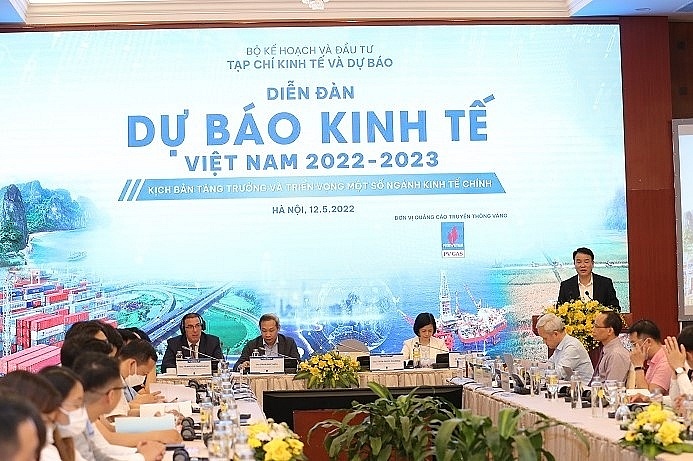Specific solutions needed for a strong recovery
 |
| MPI Deputy Minister Tran Quoc Phuong expects a strong recovery of the economy |
GDP growth in the first quarter was estimated at 5 per cent on-year. Inflation was controlled and the consumer price index in the first four months increased by 2.1 per cent.
Vietnam's Business Climate Index by EuroCham has risen to 73 percentage points, an increase of 12 points over the last quarter of 2021, which is the highest since the fourth wave of the pandemic, showing that business executives are upbeat as the country opens up. The number of newly-established enterprises in the first four months hit almost 50,000.
Analysing the impact of the world's economic movement on Vietnam, economist Can Van Luc pointed out the forecast of two GDP growth scenarios for the coming years. In the first one, the GDP growth of Vietnam will raise by 5.5-6 per cent, while in the negative scenario, it will be 4.5-5 per cent. Which occurs will be dependent on the process of pandemic prevention, socioeconomic recovery and development, and Vietnam's ability to minimise the impact of other global events.
In the view of Francois Painchaud, representative of the International Monetary Fund in Vietnam and Laos, Vietnam has successfully maintained fiscal, external, and financial stability. Macroeconomic policies have helped cushion the impact of the pandemic.
The programme for recovery and development is timely and well-placed to entrench the recovery. He expects that the national economy will recover strongly with growth of 6 per cent this year and 7.2 per cent in 2023, thanks to the supportive policies. However, he does believe that inflation will rise in the short term.
Commenting on Vietnam's inflation, Nguyen Bich Lam, former director-general of the General Statistics Office, said that three factors will put pressure on the economy, including supply chain inflation, increasing prices for materials and fuels, and aggregate demand spikes in the context of supply chain disruptions.
Lam said that it is necessary to implement some solutions, feeling that the government should resolve the difficulties in mechanisms, policies, and administrative procedures. Unreasonable regulations should be reviewed and abolished in order to cut input costs, create a fair and open business environment, promote aggregate supply, and reduce inflationary pressure.
"It is necessary to ensure that the supply of each group of materials for each industry does not depend on one market or one region," urged Lam.
According to Lam, the Ministry of Industry and Trade and the Ministry of Finance need to be transparent and simplify the trade process while sharing information on prices and promoting domestic competition for logistics, wholesale, and retail. The State Bank of Vietnam and the Ministry of Finance should closely coordinate and implement fiscal and monetary policies. Petroleum is a strategic commodity, so the selling price must be managed to ensure the interests of the state, businesses and people.
What the stars mean:
★ Poor ★ ★ Promising ★★★ Good ★★★★ Very good ★★★★★ Exceptional
Related Contents
Latest News
More News
- Strengthening the core role of industry and trade (February 19, 2026 | 08:35)
- Future orientations for healthcare improvements (February 19, 2026 | 08:29)
- A cultural development pillar for the new period (February 19, 2026 | 08:22)
- Infrastructure orientations suitable for a new chapter (February 19, 2026 | 08:15)
- Innovation breakthroughs that can elevate the nation (February 19, 2026 | 08:08)
- AI leading to shift in banking roles (February 18, 2026 | 19:54)
- IFC to grant $150 million loan package for VPBank (February 13, 2026 | 09:00)
- SABECO celebrates diverse Tet Traditions (February 11, 2026 | 08:00)
- Canada backs Vietnam’s green transition with AGILE project (February 09, 2026 | 17:41)
- Canada trade minister to visit Vietnam and Singapore (February 09, 2026 | 17:37)

 Tag:
Tag:

























 Mobile Version
Mobile Version